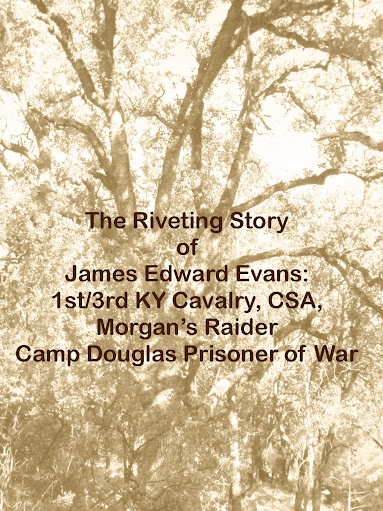When the Civil War began, both the North and South were determined to rely upon volunteer armies. No one expected the war to last very long. Therefore, neither government saw fit to enforce conscription laws, even though such laws were common place in Europe.
“In the initial upwelling after Sumter, the South, expecting a quick victory or a European intervention, mustered in most of its volunteers for only one year. But the North was even more short-sighted (and also constrained by a militia law that dated from the Whisky Rebellion) and only called its men to three months' duty.”[i]
Yet, as the war ground on, both sides were forced to turn to conscription due to the dwindling numbers of volunteers. Therefore, the draft system was established in America.
The Confederacy was deeply reluctant to turn to a draft. The Southern ideal rested upon a man of valor whose patriotism drove him to joyfully volunteer to defend his nation and his beloved family. The concept that a man might be reluctant to fight for his country was abhorrent to the Southern mindset.
Thus, the Confederacy first tried $50 bonuses to appeal to the greedy, and 60 day furloughs to appeal to the homesick, before resorting to enacting the first of its three conscription laws on April 16, 1862. However, there were loopholes. The law included exemptions for certain occupations, only-sons, and medical reasons.
Less than a year later, Abraham Lincoln signed the first national Conscription Act on March 3, 1863. The Act required all white males from ages 20 - 45 to register for service in the army. The Northern law also contained exemptions for certain occupations, only-sons, and medical reasons. Furthermore, wealthy men could hire a substitute to take their place by paying $300. Many upper class Northerners happily avoided service. This led to accusations that the Civil War had become a “rich man’s war but a poor man’s fight.”
The same cry was raised in the South where exemptions were being granted to any man owning twenty or more slaves.
“A law had been passed by the Confederate States Congress called the conscript act. ... From this time on till the end of the war, a soldier was simply a machine, a conscript. It was mighty rough on rebels. We cursed the war, we cursed Bragg, we cursed the Southern Confederacy. All our pride and valor had gone, and we were sick of war and the Southern Confederacy.
"A law was made by the Confederate States Congress about this time allowing every person who owned twenty negroes to go home. It gave us the blues; we wanted twenty negroes. Negro property suddenly became very valuable, and there was raised the howl of 'rich man's war, poor man's fight.' The glory of the war, the glory of the South, the glory and pride of our volunteers had no charms for the conscript."
~ Sam R. Watkins, First Tennessee [ii]
Rather than motivating “the stay-at-homes” to enlist, conscription laws prompted public outrage. Speeches and editorials declared conscription to be an infringement on individual free will and personal liberty. The enraged Georgia Governor, Joseph E. Brown, declared:
"No act of the Government of the United States prior to the secession of Georgia struck a blow at constitutional liberty so fell, as has been stricken by this conscription act"[iii]
Failure to report for duty, desertion, and the hiring of “substitutes” became common place, North and South.
“In October 1862, Robert Carter, a wealthy planter living in Concordia Parish, in the fertile cotton-growing delta along the Mississippi River in northeast Louisiana, faced conscription into the Confederate army. Rather than enter the service, Carter, whose family owned two plantations and 194 slaves, contracted with Frederick W. Scheuber to serve as his substitute. As a German, Scheuber was not subject to Confederate conscription and therefore could serve in someone else's place. Carter possessed both the motives and the means to avoid military service. In addition to wanting to escape the dangers inherent in life in the army, Carter possibly feared both losing control of his slaves and exposing his family to the enemy, especially with the Union army, as part of its attack on Vicksburg, less than fifty miles north of his home. With Carter's wealth exceeding $120,000, his agreement to pay Scheuber $2,500 at the end of the war and to provide Scheuber's wife with $20.83 per month (10 percent per year) until that time would not prove an insurmountable financial burden. Although Scheuber may have needed the money, he did not live to see the end of the war, perishing at Berwick Bay in April 1863, less than one year after signing his contract with Carter. During Scheuber's time of service, Carter paid the money to three of the German's female relatives, but it remains unclear whether he paid the full amount upon Scheuber's death.” [iv]
Hoping to sway more men into volunteering, the North began to offer payments known as bounties. If a draftee selected to “volunteer” before his muster date, he became eligible to receive a bounty, usually about $100. Some states and municipalities also contributed to the bounties. Thus, a man’s total bounty could exceed $500, an entire year’s pay.
Northern bounty’s led to endless difficulties. Unscrupulous men would enlist, collect their bounty, and desert. Some of these men began to grow wealthy collecting bounty after bounty. They simply enlisted in camp after camp, disappearing after the payments were made. This practice, dubbed “bounty jumping,” was as dangerous as it was lucrative. If the bounty jumper was caught, he faced death by hanging or firing squad.
Struggling to survive on the front lines, volunteer soldiers, both Northern and Southern, found themselves despising conscripts. Unwilling soldiers made untrustworthy fighting partners. Their unaccountability was an inexcusable sin. In the pitch of battle, one’s life depends upon the actions of the men to one’s left and right!
The final words on the matter should belong to a member of the 2nd Washington Artillery (Louisiana) who penned:
“They took me for a soldier and are going to make me fight
Though I could never believe myself that shooting folks was right
The only thing I’ll ever learn, is, how to run away-
Then they say they’ve found me out, that I’m a stupid lout,
I have so many orders, I don’t Know what I’m about.
But get some foreign Gentlemen, by paying in advance,
To swear you come from Germany, or Ireland, or France,
To set the matter right, have it writ in black and White,
That you’re a foreign fellow, and they cannot make you fight.” [v]
ENDNOTES
[i] Harper, Douglas. “The American Civil War: Conscription” http://www.etymonline.com/cw/conscript.htm
[ii] Watkins, Sam R. “Co. Aytch” 1962.
[iii] McPherson, J. M. “Ordeal by fire: The Civil War and Reconstruction,” 1992.
[iv] Sacher, John M., “ A Very Disagreeable Business: Confederate conscription in Louisiana,” Civil War History, June 2007.
[v]Glatthaar, Joseph T. “ General Lee’s Army: From Victory to Collapse,” 2008, p. 404
Saturday, November 22, 2008
Conscription Laws: Americans drafted into the Civil War
Labels:
Abraham Lincoln,
Conscroption,
Draft,
Joseph E. Brown,
Sam R. Watkins
Subscribe to:
Post Comments (Atom)





No comments:
Post a Comment